#selling a physician practice
Explore tagged Tumblr posts
Text
How to Sell a Medical Practice — A Simple Solution
Throughout any healthcare transaction, physicians will encounter many unexpected legal, tax, accounting, real estate, and succession planning issues that are critical to ensuring a successful closing on the deal. Oftentimes, physicians are not made aware of these complexities until it is too late in the sales process.

Challenge #1: Deal Complexities
The first challenge in selling a medical practice that physicians may encounter are unexpected legal, tax, accounting, real estate, and succession planning issues that are critical to ensuring a successful closing on the deal. Oftentimes, physicians are not made aware of these complexities until it is too late in the sales process.
Solution #1: Our Unique Experience
As owner-operators that have gone through this process ourselves, we have a detailed understanding of the various transactional complexities. Our background as licensed practitioners in investment banking, law, real estate, and accounting allows us to have a comprehensive approach to solving the potential obstacles to successfully closing a deal.

Challenge #2: Intermediaries
The second challenge in selling a physician practice is the struggle to find qualified healthcare investment banking services for smaller transactions. Because the fee structure for most investment banks makes it impractical to assist physicians on smaller deals, the alternatives are not ideal, as non-investment banking intermediaries lack the expertise or licensure to conduct these transactions. Thus, a large swath of physicians cannot find qualified and cost-effective healthcare investment banking services catered to selling their medical practice or outpatient facility.
Solution #2: Physician-Centered Investment Banking
Seigel Advisory Services was established to fill a gap in the marketplace by providing quality and affordable services to physicians for smaller transactions. As a boutique healthcare investment bank, we work closely with physicians throughout the United States seeking to sell their medical practice or outpatient facility.

Our #1 Goal — How to Sell Your Medical Practice
At Seigel Advisory Services, we serve physicians to achieve their goals and objectives through the sale of their medical practice. If you are a physician looking for an investment bank that is physician-focused, that has advisors with a legal and accounting background, and that provides affordable services, then we can be of excellent service to you!

Whether you are at the beginning stages of this journey or ready to go to market, please feel free to contact us with any questions you may have. We are honored to work with physicians who work so diligently and sacrificially to care for their patients. At Seigel Advisory Services, we aspire to make the busy lives of physicians easier by efficiently helping to answer the question ‘how to sell a medical practice.”
Selling Your Healthcare Business — A Helpful Guide

If you are researching how to sell your physician or medical practice, then this guide can help. Some of the topics in this guide include:
Knowledge of the Healthcare Industry
Mergers and Acquisitions Expertise
Medical Real Estate Expertise
The Integration of Succession Planning
How to Sell a Medical Practice
Learn about Selling your Healthcare Business
Download the guide today and learn all about efficiently selling your medical practice.

Seigel Advisory Services A Healthcare Investment Bank
691 John Wesley Dobbs Ave NE, Suite C Atlanta, GA 30312 Phone: (727) 460–4858
www.seigeladvisoryservices.com
1 note
·
View note
Text
Merlin Loregasm Rewatch S1E6 (Part1)
Hi Everyone! Welcome to my rewatch of Merlin focusing on the lore. I am a giant nerd so pretty excited about this. We’re on A REMEDY TO CURE ALL ILLS
(Hoo boy theres gonna be a LOT of lore in this one! Let's go!)
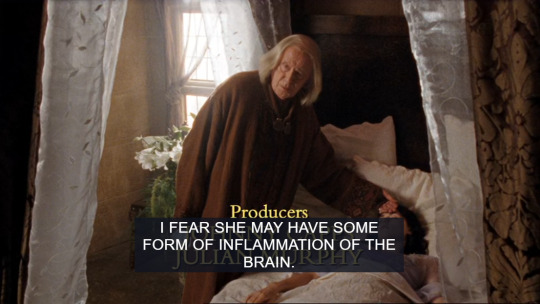
Ok more examples on how medical knowledge in Camalot is HUGLY advanced despite still beliving in Humorism and four elements. Gaius originally blames Morgana's condition on inflammation of the brain perhaps caused by infection. Infection itself was not understood and tended to be blamed on bad air, god, planetary conjunction, or natural disasters (Mostly bad air and god if it was a widespread contagion though) Some folk healers DID know how to tend it with herbs! The idea that an infection could be inside or effect distant areas like the brain in this kinda way is pretty advanced. Again I chalk this up to the world having magic. Another tool to understand what is going on around them that real history did not.

Gaius: see if you can find me some fresh rosemary and Yarrow
Rosemary and Yarrow can be combined to help achy joints, inflamed muscles, nerve pain, wounds, bruises, swelling, inflammation, and sprains Rosemary also stimulates circulation and blood flow
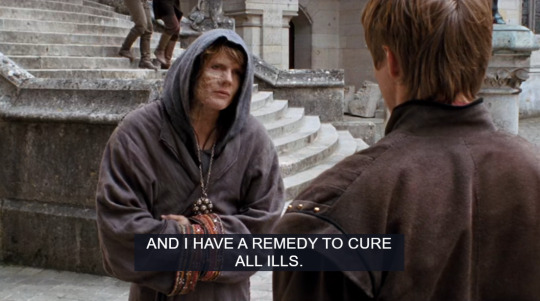
The idea of a remedy to cure all ills was very much a thing. It was called a panacea and was around as an idea from Greek times and named after a Greek goddess of medicine. Elements and Humors ALSO came from greek times, Greeks were hugely influential in science. It was greatly sought by alchemists and people of learning. This is likely part of why Arthur was not like GTFO. (Even if he was not interested in the offer at first out of loyalty to Gauis) More on this in a sec
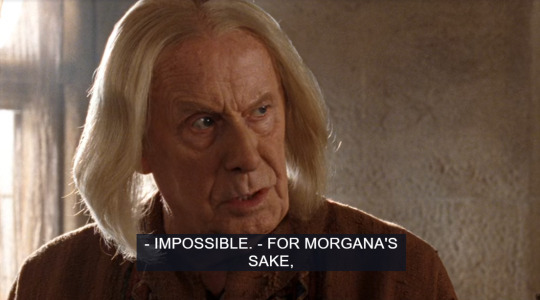
Arthur: He says he has a remedy to cure all ills
Gaius: Impossible
Arthur: For Morgana's sake surely we should at least hear him out. I mean what have we go to loose. Please father
Gaius: Probably some Charlatan hoping for a quick shilling
Arthur: I don't care if she is about to die what harm can it do!?
Two things to address here. First of all Gaius is not pulling the charlatan idea out of nowere Or the impossible. As much as a Panacrea was believed to exist. There was no proof of the concept. One might hear about it existing in distant lands or the like. But someone like Gaius might be skeptical of the concept after his MANY MANY years spent in medical practice. Its possible he tried and failed to create it himself too. FURTHERMORE selling a supposed Panacrea was a thing MANY MANY charlatans did. It was perfect for praying on desperate people.
Now onto Shilling, I belvie this is the only time a unit of money is mentioned specifically in Merlin. It originalted from an anglo saxon phrase that meant twentieth of a pound. It was intoduced as "Shilling" much later in history. So I belive it is being used here as a generalism for a small amount of money. I don't think there are actually shillings in the Merlin universe. BUT one never knows. There are a lot of other historicaly inacurate things. Its part of what makes the show so fun!

This checks out Alchemy was thought to be the way to create a Panacrea . It was mainly focused on finding a way to create enternal life and gold though the philosophers stone. (More in later eppisodes) But it was also the forerunner of modern chemistry thus a physician would use a LOT of the same equipment!
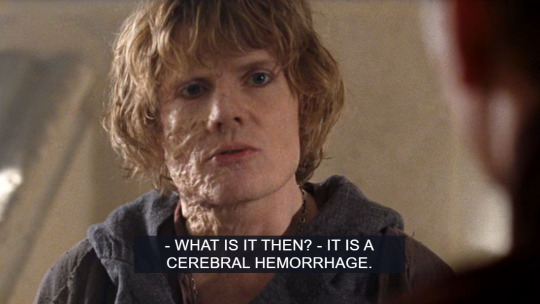
Okay in Medieval times this would normally be known as apoplexy. It came from, the greek word apoplexia meaning to be stuck down suddenly with violance, Apoplexy meant when a person was struck down for seemlingly no reason without conviousness or motion maintaining pulse and breathing and later came cover things like stokes or Cerebral Hemorrage. It was still though this was caused by Humoral issues. This would presist to near modern day. It was not until 1658 that Cerebral Hemorage was first identified as a thing diferant from other types of Apoplexy So again Medicine in BBC Merlin is WAY ahead of its time. I will chalk it up in these case once again to the existance of magic, but ALSO to the fact that autopsies were likley a thing! (I've said this many times but this is more evidence to my theory as autopsies were integral of seperating apoplexy into diferant things.)

Morgana uses the word Heaven here. While the word usualy has a conotation of christianity/jusdism/islam it can also mean pagan afterlives. Still I'm making a note in case it becomes important later.

Gaius: I wish to see the court records for the time of the great purge
Geoffery: what possible need could you have for those.
Gaius: I fear that the past may have come back to haunt us
Geoffery: all the mroe reason to keep the records hidden
Gaius: I know that neither of us wants to remember that time, but this is a matter of great urgency.
Geoffery: The record are sealed they cannot be oppened. Uther has forbidden it.
Okay we need to examine WHY Uther might have forbidden it. He has no trouble thinking about it. He has no issue mentioning it. The first episode is a celebration of it!
I mean the fact he was later tormented be seeing the souls of those he killed MIGHT hint he had some regrets about what he did? But he might just have been terrified to see them back? And compared to everything else where he seems to have no regrets?
SOOO perhaps It has to do with Ygraine's death and Arthur's birth. But they can't have recorded what they did right? Since that is a big secret? OR DID they somehow record it and Geoffery was actually one of the few in the know? Perhaps he never looked at the documents? WHY WOULD YOU RECORD IT?
If Nimueh was indeed court sorceress perhaps Uther doesnt want Arthur to be able to look at the records and see OH dad had a court sorceress that escaped just after I was born!
I'm KINDA a bit stumped here UNLESS
the line "I know neither of us wants to remember that time" Okay sure it could be Geoferry just doesnt want to remember all the people dying. BUT could it mean he was into magic too? Or had a loved one who was into magic? Was he actually IN on Arthurs birth too? Or told about it. DID THEY ACTUALLY RECORD THAT SHIT? WHY? I think they possably actually recorded it. It makes the most sence because storywise this could then be another hint at the mystery of Arthur's birth that is a bit of a focus this season and is being built up.
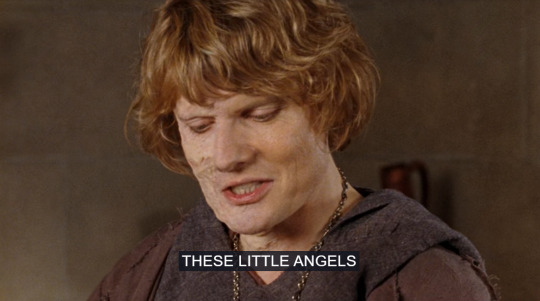
Okay Angels are not pagan at ALL. they are christian/jewish/muslim (and a few others) So we have a point towoerd at elast one of those being comon place in the merlin world. I know some fans debate camalot being some form of early christian which is why I am paying attention to all these little religion things.
My currant working theory is that there is a weirdly pagan or pagan-ajasent version of christianity that is left over from when the romans where in control. And has had a long time to blend with the traditional godess religion/culture in isolation of other christian sects. Thus a "New Religon" existing.

This is what he says giving over the records. Which okay? I mean they both likley already know what is inside. but I guess disobeying a direct order from Uther can be a death sentance? I feel like there is somthing I am missing.
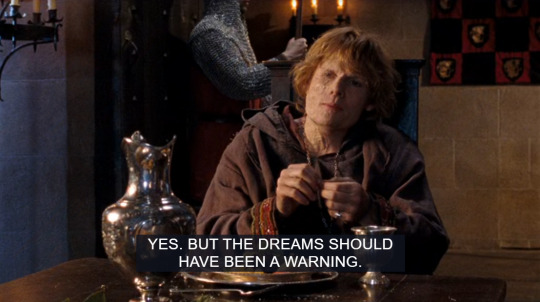
I think him mentioning this is really intersting. BECAUSE the dreams are not gonna stop. He has no reason to think they will stop. So by implying they were a warning for her condition. So either he plans to bring the condition back, Or is counting on the fact he is not going to stay for too long. He can chalk them up to her recovering sure. but eventually she will recover. Just an intersting hint that he knows he will not be staying too long.
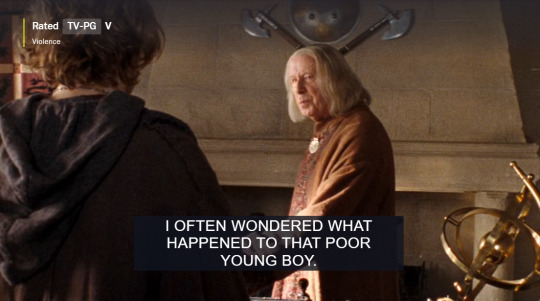
Gaius: I often wondered what happened to that poor young boy
Edwin: I told you we've never met before
Gaius: I didn't realize who you were until I check the records you used your mother's maiden name. You are Gregor and Jaden's Son
Edwin: They were freinds of yours.
Gaius: They were sorceres
Edwin: They practiced magic, so did a lot of people back them Gaius.
Gaius: Uther will be furrius when he finds out who you are
Edwin: Fine, Fine shall we tell him? lets go tell him. Lets tell him, Lets tell him everything ooh! I know we could also tell him about Merlin?
Gaius: merlin?"
Edwin: you didn't know he was a sorcerer? Tsk, ahhh I wonder what Uther will do. Problubly have him burned? Gaius: you would betray another sorccerer
Edwin: You did when you turned a blind eye and let my parents die at the hands of Uther. At least Merlin doesnt have a son that will try to rescue him from the flames? Okay first of all going back to my post on episode one I wonder if a last name means noble. If so its intersting because Uther did not reconize a noble family because a maiden name was used. Or hes not and last names are a fluke. Also although Gaius later reveals that his parents practiced dark magic he did not bring it up here. Or deny he was freinds with them. Possably because he knew it would not convince Edwin? And not everyone who practiced magic back then (A lot of people) could have used dark magic. This is the first time we realize that Gaius was essentully a colaborater. Its not a good look for him. Not only did he choose to let his freinds die to stick by Uther. HE IS STILL trying to protect Uther. But he is willing to give up Uther to protect Merlin. And is later revealed to have saved Alice. So some part of me wonders how close of freinds they could have been? One thing I wonder is if Gaius actually agreed with Uther on a level. Perhaps there were a lot of people abusing magic. (As hinted at in episode one) So he actually thinks magic is often bad and often corrupts. (To be clear I'm not excusing his behavior.) This is why he is so hesitant to let Morgana know about her magic. And he is so strict with Merlin and his. "Its not good or bad its how you use it." But a lot of people give into power and use it for bad? Is this his view?
I know a lot of people equate magic with being born diferant. I do too. Its part of why I relate to Merlin so much. But it seems like for some people in the merlin world it is less who they are and a means of Power for good or ill. (For others they are totally born with it) It does give people power others do not have (Just like being royalty does for example) I am a firm beliver of the idea that power reveals. And we see this a lot in Merlin, both in the choices Uther VRS Arthur make. and in the choices diferant sorcerers make. Back on topic I'm trying to understand why Gaius makes the choices he does. And I think the most likley thing is the man on some level ACTUALLY is afraid of magic and its capacity to currupt which he has seen a lot of and thus supports Uther one some level, perhaps this is even subconcious.
Again this is Tumblr so I need to make clear I DO NOT THINK HE IS IN THE RIGHT HERE. Gaius if this is true is missing HUGE Aspects he should take into consiteration. And the purge? the things Uther did? Just no!

This is intersting because there were not many developments in real medieval time. Another sigh there medical knowlage is very diferant in the Merlin World AND I'm cutting off here. Party because I accidenly posted partly because there is SO MUCH LORE! I will come with part 2 soon!
#merlin lore#merlin loregasm rewatch#merlin rewatch#bbc merlin#merlin lroe rewatch#gaius critical#I guess
33 notes
·
View notes
Text
When the whole thing is said and done, I hope that what comes out of the medical scandal of pediatric transition is an understanding not just of the fact that it's important not to let ideology guide practice such that real physicians tell outright lies, ideological abstractions, and/or functionally religious beliefs (that one may have been born in the wrong body, or that one may have the wrong variety of brain in their body, or that one could possibly be "harmed" by going through one's natural puberty in and of itself, etc) to patients who are literally too young to distinguish between lies and truth, but also an understanding that what happened here on the whole with the medical approach to gender dysphoria was a total abdication of duty to provide least invasive practices first, total refusal to provide justification for the practice of selling extreme body modification to people who are at least often obsessively convinced that something is wrong with their body when medicine doesn't do this regularly for any other patients with body distress, total failure of safeguarding practices in a patient group very likely to contain vulnerable and otherwise emotionally distressed patients, and most of all a refusal to even try to address the mental health concerns of a group of people that these physicians just decided on no basis (there are no large studies comparing overall outcomes with transition treated as an actual variable, wherein some people are given one treatment, others none, others another treatment, underlying this practice) were too ill to respond to all of the practices we have already accepted as approaches to psychological distress.
This is at the heart of why ROGD has so many people freaked out- sure, those people who show signs of extreme gender nonconformity in childhood, who grow more distressed than normal at the onset of puberty because it means a loss of the androgyny that protects so much of child gender nonconformity, who are likely to grow into crossdressing homosexual or bisexual adults, who are more likely than other people to struggle with obsessive and compulsive tendencies, who are more likely to struggle to connect with other people socially, I'm sure they require surgical and hormonal body modification in order to live happy and healthy lives, but I am quite sure that no such treatment is right for my sweet, outgoing, heterosexual daughter who until 6 months ago was never very gender nonconforming. People like her deserve extra safeguarding so that the only treatment medicine ever even attempted at scale for this psychological problem is reserved for the people who truly cannot be integrated into society any other way. It is really quite deeply offensive that, because very gender nonconforming people are less valued, we got none of the normal safeguarding or study or approach to treatment that people who approach doctors with broken bones or other physical problems receive. Of course there is always some very real chance that we just happened upon the "right" treatment, but for one thing we don't know that because we simply never tried anything less invasive the way one normally does in medicine (let alone actual comparative studies different potential treatment options) and for another it's currently being sold to people using ideological abstractions or functionally religious concepts that have no basis in reality like the concept of being born in the wrong body. Those are both problems no matter how long medicine is allowed to continue ignoring them, which by the way will not be forever. If medicine cannot reign itself in, if it cannot police itself, then the only actors left to reign it in are all much more susceptible to their own forms of ideological capture than medicine was, such as state legislatures, which is bad for everyone in the same way that state intervention in doctor/patient decisions is almost always bad for everyone.
#done#once i realized the majority of patients are still dysphoric when they are#which of course the goalposts always move for us because the problem isn't actually any of our body parts#but that when done we are on the whole not just still a little dysphoric but able to ignore it but still extremely obsessed#i was like okay so what the fuck are they selling us and on what basis are they selling it#and i looked really hard for that basis but mostly it seems nobody even believes they need to justify what theyre selling#it is astounding
291 notes
·
View notes
Text
At the same outpost, the player can encounter Cass, a bisexual civilian woman. She may flirt with a male Courier, who may imply they are gay, prompting her to imply gay men are more common in the Legion.[56] At the Second Battle of Hoover Dam, NCR General Oliver may remark to Courier Six: "If you think after all that's happened, I'm going to grab my ankles and take it like the Legion..."[57] This writing pertains to institutionalized homophobia which manifests in practice though power structures and social interactions without being written into law. Simply put, in his derogatory remark, the general expresses to his army that military surrender is gay, much like their gay enemy. From the brevity and bluntness of this remark, it's clear that this sentiment is already well understood among his ranks. Logically, to project strength in the eyes of such a leader, one might also project homophobia by scrutinizing and harassing one's peers and subordinates. In this atmosphere, the expression of homophobia is not only normalized, but materially incentivized, and becomes inseparable from ambition. This is why Major Knight is immediately frightened when a male Courier flirts with him. He is so profoundly alienated that he romanticizes life as a gay man under the Legion. The Legion punish homosexuality with death, and yet Knight characterizes them as more "forgiving" than the NCR.[43] Through these apparently disparate events, the audience can trace how a distorted perception of gay people emerges among insecure men in a military environment, and subsequently becomes ingrained in the corresponding civilian culture. Further, Veronica, a lesbian from the Brotherhood of Steel, also wryly remarks that she believes legionaries have gay sex about as often as straight sex.[58] She also notes that this only applies to men, as women have no rights whatsoever in Legion society. In this aside, she conveys a pre-existing frustration with lesbophobic social norms.[58] Veronica also mentions that the people of her bunker would rather she remain on the surface.[59] [...] Upon meeting Courier Six, Arcade Gannon offhandedly makes his gayness known, unprompted. The audience must face the fact that Arcade's apprehension of the Legion is far from abstract; under Legion law, he would be put to death. One possible ending gives further insight into Caesar's hypocrisy: should the player sell Arcade into slavery and leave Caesar alive, Caesar will keep Arcade as a personal physician and philosophical advisor. They intellectually spar at length, and Caesar grows singularly fond of him. Accordingly, Arcade imitates the historic suicide of Cato the Younger by disemboweling himself. Caesar understood his doctor's final gesture of contempt, and mourned him for months.[64][65][66]
written for wiki
66 notes
·
View notes
Text
Harvey’s reaction when you pass out on the floor after a day at the mines
He was making dinner when you came back in after a long day looking for gems in the mines to sell
“Hey love dinner will be done soon, how was your day?”
Que you hitting the floor like a sack of flour, unconscious
Internal and external panic from our lovely doctor
“I gotta call the doctor!! OH GOD I AM THE DOCTOR!!”
Usually he’s very calm about treating people but usually they aren’t the love of his life
He’s got you set in your bed, cleaning and treating any injuries he can see
Practically drowns you in life elixir
When you eventually regain consciousness there’s a cup of herbal tea on the bedside table for you, along with a healthy meal
Harvey’s running you a hot bath with extra bubbles and a vanilla scented bath oil
Boy do you get a lecture
“Love, darling, sweetheart please, as the town doctor and your main physician I must advise that you don’t go into the mines for at least a few days to rest. And please if you should have to go back in make sure to bring plenty of food! I don’t want to see you on my operating table any time soon”
Please listen to him he’s almost in tears as he talks he’s so stressed
Your gonna cause him to go grey so soon if you keep this up
He helps you into the bath he’s run for you, gentle skilled hands massaging shampoo and conditioner into your hair and against your scalp
“You are going to give me a heart attack one of these days my love”
Dudes been profusely sweating since you passed out please comfort him
After you get cleaned up and eat your dinner and drink your tea it’s bedtime
No farm chores after dinner today, it’s snuggle time
You spend the rest of your night cuddled up with your lovely but very stressed doctor husband who just wants you to take it easy
He will check your injury’s again in the morning before you can do any farm chores
#stardew fanfic#stardew valley#stardew farmer#stardew x reader#stardew headcanon#stardew marriage#stardew harvey#sdv x farmer#sdv x reader#sdv harvey
348 notes
·
View notes
Text
Physicians often scoff at the suggestion that their prescribing habits might be swayed by the blandishments of pharmaceutical companies. This had been a cornerstone of Arthur Sackler’s worldview: the notion that doctors are priest-like figures, immune to flattery or temptation or greed, focused exclusively on the narrow dictates of appropriate medical care. In Arthur’s view, it was laughable — even insulting — to insinuate that a colourful ad or a steak dinner might be enough to sway the clinical judgment of an MD. Doctors, he argued, simply can’t be bought. But, of course, this is no more true today than it was when Arthur Sackler said it. Doctors are human, and the notion that donning a white coat might somehow shield them from temptation is a fantasy. A 2016 study found that purchasing even a single meal with a value of $20 for a physician can be enough to change the way that he prescribes. And for all their lip service to the contrary, the Sacklers didn’t need studies to tell them this. Some years, Purdue would allocate as much as $9 million just to buy food for doctors. Richard Sackler was enough of a stickler for detail that he would never countenance such an outlay of funds unless he was assured a good return on investment. In a 1996 email to Michael Friedman, he pointed out that according to Purdue’s own data, “physicians who attended the dinner programs or the weekend meetings wrote more than double the number of new Rxs for OxyContin compared to the control group.” (“Rx” is an abbreviation for prescription.) He noted that “weekend meetings had the greatest impact. Even physicians who took no hand-outs from the company proved to be highly susceptible to the message Purdue was promoting. “The primary goal of medical practice is the relief of suffering, and one of the most common types of suffering that doctors see is pain,” David Juurlink, who runs the Division of Clinical Pharmacology and Toxicology at the University of Toronto, pointed out. “You’ve got a patient in pain, you’ve got a doctor who genuinely wants to help, and now suddenly you have an intervention that — we are told — is safe and effective.” What the company was really selling, some of Purdue’s marketing materials suggested, was “hope in a bottle.”
Patrick Radden Keefe, Empire of Pain: The Secret History of the Sackler Dynasty
7 notes
·
View notes
Text
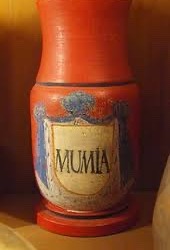
Mummia, Mumia, or originally mummy referred to several different preparations in the history of medicine, from “mineral pitch” to “powdered human mummies”. It originated from Arabic mūmiyā “a type of resinous bitumen found in Western Asia and used curatively” in traditional Islamic medicine, which was translated as pissasphaltus in ancient Greek medicine. In medieval European medicine, mūmiyā “bitumen” was transliterated into Latin as Mumia meaning both “a bituminous medicine from Persia” and “mummy”. Merchants in apothecaries dispensed expensive mummia bitumen, which was thought to be an effective cure-all for many ailments. It was used as an aphrodisiac. Beginning around the 12th century when supplies of imported natural bitumen ran short, mummia was misinterpreted as “mummy”, and the word’s meaning expanded to “a black resinous exudate scraped out from embalmed Egyptian mummies”. This began a period of lucrative trade between Egypt and Europe, and suppliers substituted rare mummia exudate with entire mummies, either embalmed or desiccated. After Egypt banned the shipment of mummia in the 16th century, unscrupulous European apothecaries began to sell fraudulent mummia prepared by embalming and desiccating fresh corpses. Scholars proved that translating bituminous mummia into a mummy was a mistake, physicians stopped prescribing the ineffective drug. Artists used ground-up mummies to tint a popular oil paint called mummy brown.
Noble’s new book, Medicinal Cannibalism in Early Modern English Literature and Culture, and Richard Sugg’s Mummies, Cannibals, and Vampires: The History of Corpse Medicine from the Renaissance to the Victorians, reveal that many Europeans, including royalty, priests, and scientists, routinely ingested remedies containing human bones, blood and fat as medicine for everything from headaches to epilepsy. There were few vocal opponents of the practice, even though cannibalism in the newly explored Americas was reviled as a mark of savagery. Mummies were stolen from Egyptian tombs, and skulls were taken from Irish burial sites. Gravediggers robbed and sold body parts. #africanhistory365 #africanexcellence
4 notes
·
View notes
Text
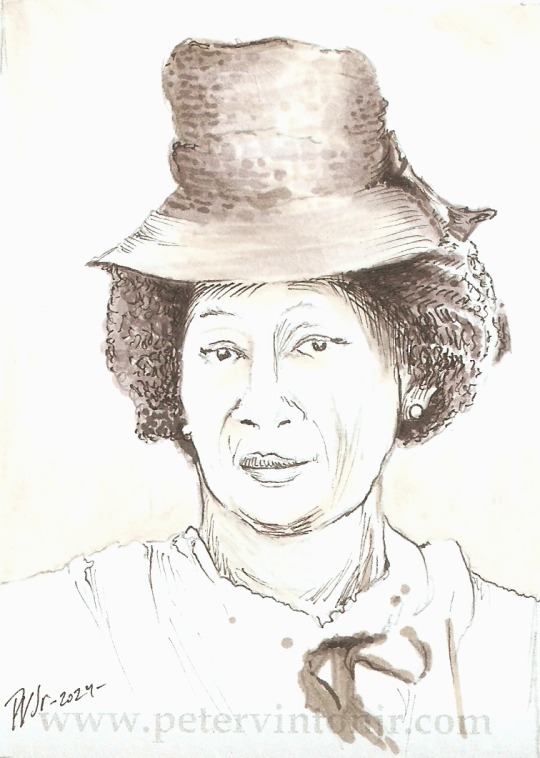
Welcome to Pride Month, 2024 (and incidentally also marking the fourth anniversary of the start of this project). Let us kick things off with a look at the life of Lucy Hicks Anderson, who was born in 1886 Kentucky (which should help set some context).
Identifying and dressing/behaving as a woman, Lucy (neé Lawson) was raised by uncharacteristically supportive parents (for the time) and even took the advice of an equally uncharacteristically supportive physician to continue to live as her true self. She worked as a domestic at a Pecos, Texas hotel and studied to become a chef, meticulously saving her money over the next ten years. She moved to Oxnard, California in 1920, where she married her first husband, Clarence Hicks. The couple bought several properties and opened a number of businesses; to include restaurants, a speakeasy, and a bordello (brothel). The couple divorced in 1929 but Lucy continued to operate and manage most of the properties.
Over the Prohibition years Lucy became well-known in her community, donating to local charities and hosting lavish parties for men headed off to war --and also consoling grieving spouses and parents. Lucy had become a well-known socialite and a deeply admired figure in the eyes of local politicians, clergy, and law enforcement alike --even selling bootleg liquor (a practice the local constabulary just never quite seemed to notice!) By the time of her second marriage to U.S. Army soldier Reuben Anderson in 1944, she had purchased nearly $50,000 in war bonds.
After the war, U.S. Navy sailors and officers reported an STD outbreak, which was unfortunately traced back to Lucy's bordello. Over the course of the investigation Lucy's "ruse" was exposed and she and Reuben were both arrested on fraud charges and ultimately charged with perjury since it was illegal for two "men" to be married in the state of California at the time --invalidating Lucy's marriage license and making her the first Black American trans woman to be put on trial for her identity. The fraud charges stemmed from the fact that Lucy had been receiving subsistence allotments as the wife of a soldier.
Lucy defended herself vigorously in court (also making her the first-ever recorded trans person to do so), and while at first was only looking at ten years' probation, ultimately the added fraud charges drew a much harsher sentence, and she and Reuben were sent to separate Federal prisons. They were also banned from the town of Oxnard and a very specific prohibition was laid onto Lucy, forbidding her from ever wearing women's clothing. Upon serving out their sentences in 1950, the couple resettled in Los Angeles. Lucy herself died in 1954.
#blm#black lives matter#black history#pride month#lgbtq+#trans pride#lucy hicks anderson#prohibition#teachtruth#dothework
5 notes
·
View notes
Text
better late than never, but here is all of my muses event jobs / whether they're aware of the fact they aren't actually from medieval dc !!
atticus lincoln | unaware | physician
link thinks he's been in medieval dc forever, and he definitely goes by atticus in this time period. he's working as a doctor.
bash de poitiers | aware | druid (open to arranged marriage)
bash knows he's not from medieval dc, but he doesn't care. he's slotted back into his previous life, roaming around helping people.
bonnie bennett | unaware | apothecary owner (open to memory change)
bonnie knows she's a witch, but she doesn't exactly want to get burned at the stake, so she's selling magical things in an apothecary to help people and keep her cover.
cleo sertori | unaware | diver
cleo is using her mermaid powers to the best of her ability. you drop something in the bottom of a lake? she's your girl, just go away while she's looking for it, because nobody can find out about her tail.
corin volturi | aware | unemployed
corin knows she's not from medieval dc, and she's not happy about being dragged here. she was just getting used to building a life, and now she's stuck in a time she doesn't want to be in. she's not going to be pleasant about it.
edmund bridgerton | aware | landlord
edmund might know he isn't from medieval dc, but it is a lot closer to what he's familiar with than modern day dc. at least there's horses! he's a landowner & landlord in this time.
enola holmes | unaware | sherrif (open to memory change)
though enola is unaware of who she really is, she's working as a sheriff in medieval dc, and she's rather good at it.
henri beckford | unaware | inn keeper
nobody better question why half the people who check into the local inn go missing, henri has no idea.
jo laughlin | unaware | midwife
jo is living her best life in medieval dc. she's no longer somebody who got murdered by her twin brother at her own wedding, she's a medieval midwife and she's good at it.
laurent da revin | aware | unemployed
laurent just wants life to stay normal for a few months, that's all. please.
lexie grey | aware | surgeon
lexie is trying her hardest to work as a surgeon and help people, but the cleaning practices leave a lot to the imagination, so she's a lot less help than she'd like to be!
lola fleming narcisse | unaware | lady in waiting
lola is slotting back into where she was destined to be, serving a noblewoman. it's what she loves to do, and she's good at it.
lydia bennet | unaware | ladies maid (open to arranged marriage)
lydia is working as a ladies maid to a rich noble woman, but she would much rather be the rich noble woman herself.
noel kahn | aware | tavern employee
noel had no idea how he was meant to get a job in medieval dc, but he wandered into a tavern one day and nobody asked questions, so here he's stayed. he'd like to go home though.
penelope park | aware | herbalist
penelope just wants to make it home, but she's spending her time making potions and whatnot to sell at a local market.
rebekah mikaelson | unaware | nurse (open to arranged marriage)
rebekah believes that medieval dc is where she's been since she became a vampire. she doesn't know she's over 1000 years old, but a recently turned vampire who has taken up a job as a nurse to cover her tracks, and also try and help people.
riley biers | unaware | assassin
riley is very good at his job, that's all. (nobody is left partially alive to turn into a vampire. never.)
simon basset | aware | nobleman
simon is a duke, and he's very glad to be able to be a duke here in dc. he's back to living his life, and is just glad that daphne and auggie are okay.
valerie tulle | unaware | scribe (open to arranged marriage & memory change)
valerie is a scribe for a local lord, writing down his every thought. it's mind numbing work, but it pays decently & she has a roof over her head.
vic hughes | unaware | thespian (open to arranged marriage)
vic is generally seen putting on performances for local nobility, whether she is singing or acting, or perhaps a little both.
4 notes
·
View notes
Text
“By the 1750s a concern of farming families was the scarcity of good farmland. The fact that an entire continent lay before them gave little comfort to people then living on the eastern seaboard. Parents hoped that their children could settle near them rather than move to a frontier area. But land became more and more expensive, and most families could not afford to buy farms in settled areas for all their children. Some sons and daughters had to migrate. Initially, they moved to distant towns, and then, as the century progressed, to frontier areas such as Maine, western Massachusetts, New York, Pennsylvania, and even Ohio.
…The idea of the subsistence farm, on which a family raised everything it needed for a comfortable living, rarely was realized. Most people traded crops, goods, and services. Generally, this was accomplished locally, and many individuals never visited the thriving commercial centers of Boston, New York, and Philadelphia. But they came to depend more and more on people who did, traveling peddlers or local merchants who went to large towns and cities to get goods to trade in rural areas.
…For women, life on an isolated farm was particularly difficult because of the nature of their work roles and health care needs. Men living in rural areas still traveled to town to conduct necessary business such as selling crops and trading goods produced on the farm. Their work in town gave them opportunities for social interaction, the chance to gossip or discuss the political questions of the day. But women generally stayed close to home, restricted by pregnancy, the needs of nursing infants and small children, and their daily work routines.
…Women skillful in the use of medicines and knowledgeable about the human body provided valuable services to their neighbors and communities as well as to their own families. They often were as successful as professional physicians in treating their patients. Like many crafts and trades, healing was learned through an apprenticeship. As a result, the daughters of healers and midwives frequently followed in their mothers’ footsteps, becoming local experts consulted for their special knowledge and skill. This pattern was just as common for African Americans and Indians as it was for whites.
…Literate women often kept medicinal recipes, called ‘receipts,’ in the same books in which they wrote down their cooking recipes. A receipt for cough syrup might be found between recipes for ginger cake and stuffed fowl. In addition, women grew standard ingredients for medicines in their gardens. Herbs such as vervain and Jerusalem oak were known to expel worms in children; caraway relieved colic; and marigold quickened the healing of cuts, bruises, and sprains.
Most women also had experience in attending births. Unlike Native American women, who generally gave birth alone or with one attendant in an isolated location, white women gathered relatives and friends together for births in their own homes. Labor and delivery generally were attended by several female relatives in addition to the midwife. …Husbands stayed at hand, but they were not crucial figures in the birth of their children unless it was not possible for women attendants to be there. (The modern turnabout is interesting: Today husbands generally are present at their children’s births, and female relatives and friends are excluded.)
…Births were almost public affairs in the community of women. During a normal labor, women visited, sewed, exchanged bawdy stories, and gave details of their own past deliveries. Their presence demonstrated women’s concern for each other, the importance of female bonding at this crucial time, and significance accorded a woman’s labor--her travail. Friends wanted to be at the scene, a part of the ritual of birth. They regarded attendance at a birth as both a duty and a privilege. On a more practical level, for the new mother the psychological benefits of having friends nearby was great.
…Like their white mistresses, African-American women preferred to have the company of relatives and friends during childbirth. The work routines of slaves often made this impossible, but women other than midwives sometimes were allowed to leave the fields to assist at births. Black and white women regularly attended each other in childbirth, especially when few women lived within easy traveling distance. White women valued the help of a skilled black midwife, and black women similarly relied on the aid of their white mistresses when their labor began. Childbirth was one occasion that called for the breakdown of racial barriers.
…In order to care for their families, neighbors, and relatives, women needed a broad education in both mundane tasks (such as whitewashing the house and raising vegetables) and activities requiring considerable skill (such as caring for the sick and spinning). Many women knew at least a little about healing, producing cloth. Dairying, and brewing, and they all performed the day-to-day, backbreaking labor of gardening; preparing and preserving food; raising and killing poultry; hauling water; and in between, of course, bearing, breastfeeding, and caring for young children.
…Women were most in need of household assistance when their children were young. One infant usually did not prevent a woman from fulfilling her household obligations, but when a second baby arrived, she needed help. The older child, now usually two to two-and-a-half years old, required constant supervision, and the infant needed much of its mother’s time for breast-feeding. (Bottle feeding was not practiced unless a mother was ill or had died. Lack of sterilization made it unhealthy, and bottle-fed babies rarely lived.)
…Even wealthy women had to labor very hard, and the help of slaves was essential when there were few relatives and neighbors nearby to share work. Enslaved women therefore assisted with both child care and housekeeping, just as white servants did. Acculturated African-American women generally received these jobs because they could speak the language of their owners and had grown accustomed to white customs and manners. As slaves, they were not paid wages, worked long hours, and often were forced to live apart from their own families.
…Inadequate household help was not only inconvenient or burdensome for a mother. It could actually prove to be dangerous for young children, who consequently went without adequate supervision. While a housewife tended the fire or milked her cows, a youngster might pull over a kettle of boiling water, pick up a knife carelessly left within reach, or wander away into the fields or the woods. …In the absence of adequate child care, mothers sometimes relied on physical restraints to control the movements of their very young children. A high chair or go-cart, the colonial equivalent of a modern baby’s walker, could keep a child from crawling underfoot or into an open fireplace. But such devices could not replace a mother’s watchful eye, and accidents still occurred.
…If a farm had enough laborers--and in the South this was more and more often the case as the 18th century progressed--an elderly woman might be placed in charge of caring for several very young children while their parents worked. On larger farms and plantations slave women might be allowed to return home to breast-feed their infants at certain times during the day, or a baby might be brought back to its mother for nursing. In either case, from a very early age black children had to learn to be independent of their mothers for most of the day. Only on Sundays were women allowed to spend all of their time with their children.
…Under the law any child born of a slave mother also was a slave, and therefore could be sold at any time. Slave marriages had no legal validity, which gave slaveowners the right separate slave spouses at will. As a result, enslaved women lived with the constant fear that they might be separated from their children and husbands. When an owner migrated to a new area, suffered financial setbacks, or died, black workers went up for sale. Most slave owners made no attempt to keep families together. As a rule, breast-feeding infants were sure to stay with their mothers, for otherwise the babies were likely to die. Their deaths would rob their white owners of valuable property.”
- Marylynn Salmon, “The Community of Women: Childrearing and the Sexual Division of Labor.” in The Limits of Independence: American Women, 1760-1800
5 notes
·
View notes
Text
January, February and early March updates
Why can’t I just keep a schedule and make a post about updates at the beginning of a month or something? *sigh*
8th of January 2023: Becks’ One Tile FT Cribs and Changing Table with 2 recolorable subsets - I fixed a piece of code that could lead to an error for people who don’t own M&G
12th of January 2023: TS4 fin one and fin two blue recolors - improved blue recolors of fin one and fin two present in standalone am files.
13th of January 2023: umbodyclosedcoatlongpants default - added new version of default with which aqua lapels recolor has got white shoes
1st of February 2023: sell poison from inventory - sims with ‘born salesperson’ trait will now sell poisons to their enemies, but they will deduce additional $25 per item from them (non-enemies won’t pay extra price)
1st of February 2023: herbal crafting station - Sims can now use the station to apply for the cure maker’s license if you have ‘physician’ trait by @sunmoon-starfactory in your downloads folder
6th of February 2023: Daffodil dress with docs and sandals - I followed @pforestsims tip, because it's smart, and put some shoes textures inside mesh files. I only moved black docs to AF Daffodil dress docs mesh file, because there's one recolor that uses floral docs and one recolor that uses red docs. I also moved black and brown sandals texture to AF Daffodil dress sandals mesh file - light brown sandals texture still can be found in the cream recolor.
6th of February 2023: witches can gain energy by meditating, part 1, part 2 and part 3 of bending mod, useable half-pipe - disabled “view” interaction on objects that are placed in Sims’ hands or on their feet (staves, bending effects, skateboard, snowboards)
7th of February 2023: MogHughson’s manuscript displays novel writing progress - added two new versions: both incorporate @midgethetree‘s Practice Writing edit of the manuscript, but one of versions is also compatible with @episims‘ Pencils by Color Traits
7th of February 2023: monk robe for women, long airbender tunics - added new two-groups version of monk robes in case you want to use @simborg‘ edit shared by Almighty Hat. Old three-groups version is still available in the download file.
11th of February 2023: sell cure from inventory, sell poison from inventory - added versions of these mods that are compatible with @episims‘ Gifts by Color Traits
15th of February 2023: Bigfoot mod - added compatibility for Pick'N'Mix’ “Age Transition Messages”
23rd of February 2023: part 1 of Klyntar mod - I removed “view” interaction from Klyntar blob, but I added option to put the symbiote into inventory from live mode (action called Take Symbiote) and alternate way of viewing the alien (action What is that thing?) with reaction depending on traits
23rd of February 2023: cleaner hospital mod - restored turning ambulance into book, improved nurses and dialogs; collab with aelflaed
23rd of February 2023: Chris Hatch hospital mod + visit other Sims made compatible with witches only fly if have broom, CJH’s hospitals, visits and Midge’s ‘witches only fly if have broom’ - Globe edition - improved dialogs; collab with aelflaed
5th of March 2023: even more computer options - fixed deletion of token which controls Sims’ thought bubbles during writing and browsing paranormal blogs
23 notes
·
View notes
Text
The dangers of the "Male Practice" lay not so much in the gender of its practitioners as in the economics of their situation. The early American regular doctors were not, in most cases, men of wealth and status like the British physicians they took as models. Their survival depended on their ability to convince large numbers of people that healing was a commodity—and that it was well worth paying for. This required that the act of healing become, first of all, tangible and discrete—so you could see what it was you were paying for—and, second of all, quantifiable, so you could be convinced to pay various amounts of money for various "amounts" of healing.
Herein lies a contradiction that haunts regular medicine to this day: healing is not something that can easily be bent into such a form. The medical care which we all recognize without question as a commodity today—something produced by an "industry," bargained for by unions, and paid for by "consumers" (increasingly, with the same credit cards that buy airplane tickets, restaurant meals, and shoes)—is a far cry from the more ancient and holistic notion of healing. Healing cannot be made discrete and tangible; it involves too many little kindnesses, encouragements, and stored-up data about the patients' fears and strengths (all the things trivialized today as "bed-side manner"). It cannot be quantified: the midwife does not count the number of times she wiped the parturient woman's forehead or squeezed her hand. Above all, it cannot be plucked out—as a thing apart—from the web of human relationships which connect the healer and those she helps.
So the problem faced by the early regular doctors (which we might call the congenital defect of commercial medicine) was not merely to convince people that they had something beneficial to sell, but to convince people that they had some thing at all to sell. John Morgan discovered this in his campaign to bring the British distinction between physicians and druggists to colonial America. He tried to persuade his own clients to pay for his services separately from the drugs he prescribed (it was customary at the time for one bill to cover both). But the patients balked: Drugs were one thing, but what were his "services"? Why pay for advice, or for visits from a man who should be concerned about you anyway? Unable to sell himself, Morgan had to be content with selling drugs.
-Barbara Ehrenreich and Deirdre English, For Her Own Good: 150 Years of the Experts’ Advice to Women
#barbara ehrenreich#Deirdre English#medical history#commercialization of medicine#healing vs medicine
9 notes
·
View notes
Text



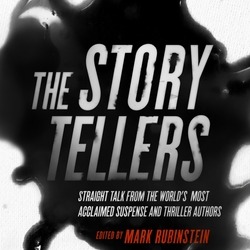
November is... National Novel Writing Month!
Dear Ally, How Do You Write a Book? by Ally Carter
Have you always wanted to write a book, but don't know where to start? Or maybe you're really great at writing the first few chapters... but you never quite make it to the end? Or do you finally have a finished manuscript, but you're not sure what to do next? Fear not - if you have writing-related questions, this book has answers! Whether you're writing for fun or to build a career, bestselling author Ally Carter is ready to help you make your work shine. With honesty, encouragement, and humor, Ally's here to answer the questions that writers struggle with the most.
Filled with practical tips and helpful advice, Dear Ally is a treasure for aspiring writers at any stage of their careers. It offers a behind-the-scenes look at how books get made, from idea to publication, and gives you insight into the writing processes of some of the biggest and most talented YA authors writing today.
Refuse to Be Done by Matt Bell
They say writing is rewriting. So why does the second part get such short shrift? Refuse To Be Done will guide you through every step of the novel writing process, from getting started on those first pages to the last tips for making your final draft even tighter and stronger.
From lauded writer and teacher Matt Bell, Refuse to Be Done is encouraging and intensely practical, focusing always on specific rewriting tasks, techniques, and activities for every stage of the process. You won’t find bromides here about the “the writing Muse.” Instead, Bell breaks down the writing process in three sections. In the first, Bell shares a bounty of tactics, all meant to push you through the initial conception and get words on the page. The second focuses on reworking the narrative through outlining, modeling, and rewriting. The third and final section offers a layered approach to polishing through a checklist of operations, breaking the daunting project of final revisions into many small, achievable tasks.
Whether you are a first time novelist or a veteran writer, you will find an abundance of strategies here to help motivate you and shake up your revision process, allowing you to approach your work, day after day and month after month, with fresh eyes and sharp new tools.
The Book Bible by Susan Shapiro
Hundreds of thousands of books come out every year worldwide. So why not yours? In The Book Bible, New York Times bestseller and wildly popular Manhattan writing professor Susan Shapiro reveals the best and fastest ways to break into a mainstream publishing house. Unlike most writing manuals that stick to only one genre, Shapiro maps out the rules of all the sought-after, sellable novels, memoirs, biography, how-to, essay collections, anthologies, humor, mystery, crime, poetry, picture books, young adult and middle grade, fiction and nonfiction. Shapiro once worried that selling 16 books in varied sub-sections made her a literary dabbler. Yet after helping her students publish many award-winning bestsellers on all shelves of the bookstore, she realized that her versatility had a huge upside. She could explain, from personal experience, the differences in making each kind of book, as well as ways to find the right genre for every project and how to craft a winning proposal or great cover letter to get a top agent and book editor to say yes.
This valuable guide will teach both new and experienced scribes how to attain their dream of becoming a successful author.
The Storytellers edited by Mark Rubinstein
Have you ever read a suspense novel so good you had to stop and think to yourself, "How did the author come up with this idea? Their characters? Is some of this story real?" For over five years, Mark Rubinstein, physician, psychiatrist, and mystery and thriller writer, had the chance to ask the most well-known authors in the field just these kinds of questions in interviews for the Huffington Post.
Collected here are interviews with forty-seven accomplished authors, including Michael Connelly, Ken Follett, Meg Gardiner, Dennis Lehane, Laura Lippman, and Don Winslow. These are their personal stories in their own words, much of the material never before published. How do these writers' life experiences color their art? Find out their thoughts, their inspirations, their candid opinions. Learn more about your favorite authors, how they work and who they truly are.
#nanowrimo#novel writing#nonfiction#reading recommendations#reading recs#book recommendations#book recs#library books#tbr#tbr pile#to read#booklr#book tumblr#book blog#library blog#readers advisory
4 notes
·
View notes
Note
We have similar views on transition so I’m kinda surprised you keep mentioning “born in the wrong body” or people thinking natural body processes are “harmful.” Some might think that, but “my body is not wrong” has been a popular pro-trans talking point + most trans people wouldn’t hesitate to say they don’t think their body is *bad,* they just want a different kind of body, hence the modifications. Don’t you think that’s a critical distinction when discussing the ethics of medical transition?
The notion of being born in the wrong body is still very popular, not just among trans people but as part of the ideological package that most people have bought as the only way to think about trans people other than hating them- that is, even if a majority of people who identify as transgender don't think they were born in the wrong body, a significant portion do, and an even larger portion do think that something is wrong with their body when it isn't, and all of that is just a matter of different people feeling different about their bodies, which is fine, but medical professionals are unfortunately still using this rhetorical way of speaking to patients they know are vulnerable and in pain, and worse they're sometimes using it to inform the decisions of children who are literally too young to know it is impossible that they were born in a body that is incorrect for them. In particular, physicians are, it seems, quite regularly telling children or implying to them that going through puberty specifically (which is all I mean by natural process, it's just the process by which human children become adults) will harm them- people like Joanna Olson Kennedy are literally telling distressed children that their natal puberty is the "wrong" puberty, or that they were possibly incorrectly sorted into a girl body, etc.
Honestly, I don't know whether I agree that most people who are undergoing expensive and difficult and sometimes very medically risky surgical and hormonal interventions on their body see them as what they are, which are modifications to the body they already have- many see them, and some clinicians are literally selling them, as medical pathways to discovering one's true human self, or even creating a new body- and more importantly, I don't think those are actions most people take unless they feel very pressingly that something about their body is bad, and so bad that they want to change it. Nobody has ever been granted "a different kind of body" by transition, they've been granted modifications to their own body that they were born in and will die in. Which is fine, people modify their bodies all the time to various ends. But I think the narrative that transness is what happens when a person's brain codes their sex wrong, or that transition is a medical process that involves fixing something that is medically in need of fixing, is still extremely popular. Most importantly, none of this should matter in terms of best medical practice for fixing a medical problem, and that is much more crucial to the ethics of medical transition from my perspective than anything else. The question is what patients are being told transition can grant them, what patients are being told transition is, etc. Very similarly, I don't think every doctor who prescribes antidepressants is engaging in medical malpractice. But I think the widespread nature of antidepressant use combined with what doctors are letting their patients believe antidepressants are/can do for them, what depression is, etc point to a lot of doctors lying to patients or letting them believe lies, in a way that is detrimental to patients and patient success in living a life.
67 notes
·
View notes
Note
My boyfriends entire family has always been neck deep into the homeopathic remedies. I suppose they had a bad time with the traditional vaccines and were convinced that all their illnesses came from those vax. I was talking to him about it a little because he went off on something about how the medicine can even cure suicidal tendencies...LOL his argument against it was "Well it couldnt be placebo because, placebo only works if the person believes the medication to work and wants it to work. And, do people with suicidal tendencies actually want it to work? But yet it still does." ???Coincidentally, the entire family is Christian... I almost feel bad for whoever gets trapped in the clutches of this stupid scam because its predatory almost. On some level I guess I can kind of see some plausibility for something like a rash or something topical maybe, but its bonkers how they think fucking Belladonna and alcohol dilution is the cure all substance for Schizophrenia!! Taking a known poisonous plant that causes hallucinations and delusional thinking (yk, cause its poisonous) and mixing it with alcohol and water, so much to the point of where there is hardly any plant substance left, comical as hell. But I guess "like cures like" or whatever.
Some aspects of homeopathy do seem to dovetail closely with religious faith healing. Magical thinking about anointing with oils and magical thinking about "water memory" are not far apart.
Other aspects of it seem to line up with that granola "all natural," "chemical free" mentality. So it seems like the kind of scam that appeals to people of many different stripes.
On placebos, you should show him the below. This study was particular to IBS (Irritable Bowel Syndrome) specifically because it's a subjective ailment (versus, say, tumors that objectively exist and are measurable). The authors admit it needs further study to see how applicable this is to other conditions.
The problem with homeopathy is, of course, not that it's a placebo - it's just plain lucky that it is when they're using Belladonna. It's that they lie about it not being a placebo. They're lying about it, selling it as real medicine, complete with real medicine price tag rather than sugar/water price tag, when it's not.
==
Introduction
Placebo treatment can have a significant impact on subjective complaints. Furthermore, recent studies have shown measurable physiological changes in response to placebo treatment that could explain how placebos alter symptoms. A critical question is establishing how physicians and other providers can take optimal advantage of placebo effects consistent with their responsibility to foster patient trust and obtain informed consent. Directly harnessing placebo effects in a clinical setting has been problematic because of a widespread belief that beneficial responses to placebo treatment require concealment or deception. This belief creates an ethical conundrum: to be beneficial in clinical practice placebos require deception but this violates the ethical principles of respect for patient autonomy and informed consent. In the clinical setting, prevalent ethical norms emphasize that “the use of a placebo without the patient's knowledge may undermine trust, compromise the patient-physician relationship, and result in medical harm to the patient.” Nevertheless, a recent national survey of internists and rheumatologists in the US found that while only small numbers of US physicians surreptitiously use inert placebo pills and injections, approximately 50% prescribe medications that they consider to have no specific effect on patients' conditions and are used solely as placebos (sometimes called “impure placebos.”) Many other studies confirm this finding. Given this situation, finding effective means of harnessing placebo responses in clinical practice without deception is a high priority.
[..]
The objectives of this study were to assess the feasibility of recruiting IBS patients to participate in a trial of open-label placebo and to assess whether an open-label placebo pill with a persuasive rationale was more effective than no-treatment in relieving symptoms of IBS in the setting of matched patient-provider interactions.
Design
A three week randomized controlled trial (RCT) comparing open-label placebo to no-treatment controls was conducted between August 2009 and April 2010 in a single academic medical center. Written informed consent was obtained from each patient prior to participation on the study. The Beth Israel Deaconess Medical Center Institutional Review Board approved the design and informed consent.
Patients who gave informed consent and fulfilled the inclusion and exclusion criteria were randomized into two groups: 1) placebo pill twice daily or 2) no-treatment. Before randomization and during the screening, the placebo pills were truthfully described as inert or inactive pills, like sugar pills, without any medication in it. Additionally, patients were told that “placebo pills, something like sugar pills, have been shown in rigorous clinical testing to produce significant mind-body self-healing processes.” The patient-provider relationship and contact time was similar in both groups.
Two-group, randomized, controlled three week trial (August 2009-April 2010) conducted at a single academic center, involving 80 primarily female (70%) patients, mean age 47±18 with IBS diagnosed by Rome III criteria and with a score ≥150 on the IBS Symptom Severity Scale (IBS-SSS). Patients were randomized to either open-label placebo pills presented as “placebo pills made of an inert substance, like sugar pills, that have been shown in clinical studies to produce significant improvement in IBS symptoms through mind-body self-healing processes” or no-treatment controls with the same quality of interaction with providers. The primary outcome was IBS Global Improvement Scale (IBS-GIS). Secondary measures were IBS Symptom Severity Scale (IBS-SSS), IBS Adequate Relief (IBS-AR) and IBS Quality of Life (IBS-QoL).
[..]
Discussion
We found that patients given open-label placebo in the context of a supportive patient-practitioner relationship and a persuasive rationale had clinically meaningful symptom improvement that was significantly better than a no-treatment control group with matched patient-provider interaction. To our knowledge, this is the first RCT comparing open-label placebo to a no-treatment control. Previous studies of the effects of open-label placebo treatment either failed to include no-treatment controls [27] or combined it with active drug treatment. [28] Our study suggests that openly described inert interventions when delivered with a plausible rationale can produce placebo responses reflecting symptomatic improvements without deception or concealment.
Our results challenge “the conventional wisdom” that placebo effects require “intentional ignorance.” [29] Our data suggest that harnessing placebo effects without deception is possible in the context of 1) an accurate description of what is known about placebo effects, 2) encouragement to suspend disbelief, 3) instructions that foster a positive but realistic expectancy, and 4) directions to adhere to the medical ritual of pill taking. It is likely our study also benefited from ongoing media attention giving credence to powerful placebo effects.
Both treatment arms were given in a context of a warm patient-provider relationship. It is possible that this relationship had a positive benefit for the patients, and indeed, the no-treatment arm showed improvement. Given that patients in both treatment arms experienced the same frequency and duration of contact time and the content of the interaction was very similar, we believe that the incremental improvement in our open-label arm was due to the addition of open-label placebo treatment. The magnitude of improvement reported by those on open-label placebo treatment was not only statistically significant but also clinically meaningful.
[..]
In summary, our study suggests that patients are willing to take open-label placebos and that such a treatment may have salubrious effects. Further research is warranted in IBS and perhaps other illnesses to confirm that placebo treatments can be beneficial when provided openly and to determine the best methods for administering such treatments.
#homeopathy#homeopathy is fraud#placebo#placebo effect#ethical placebos#fake medicine#belladonna#magical thinking#human psychology#naturalistic fallacy#religion is a mental illness
7 notes
·
View notes
Note
How do you imagine Ethan and Tobias as pensioners? Any particular hcs on which of their traits might soften and which become more stubbornly ingrained?
Hey Nonny, Thanks for the ask!
It's so funny - because the word "pensioners" really means nothing in America - because almost no one gets a pension. lol So let's go with retirees.
When Ethan retires, I don't think he'll miss work. Sure, work was a huge part of his life, but by then, he'd have decades with his wife and daughter, and he would have endured the loss of his father, Naveen, and Kaycee's parents. By this point in time, he knows there is much more to life, and he's looking forward to embracing it.
I think his time would be spent between the condo they buy near their daughter, Emma, and at the beach home where he and Kaycee will spend most of their time. I HC that he took up painting (doctor's orders to find a relaxing hobby) over the years, and he's honestly quite good. He will spend a lot of time painting and even sells his works at a small gallery near their home on Cape Cod.
If Emma has children by then, he will spend lots of time with them (which Emma really appreciates!), and he will still have a hand in the medical community by occasionally teaching as an adjunct professor and writing. And, of course, he will spend as much time as he can with Kaycee.
Tobias and Casey start a family practice together in Washington DC after their 3rd daughter, Kayla, is born. Their middle daughter, Brooke, is also a physician and takes over the practice. So, even after retirement, the two of them still do some work there, primarily in the free/low-cost clinic portion.
Still, his life will have much more time spent away from work. He and Casey will spend time with their 3 daughters and grandchildren, and they will be very involved in their charity work.
Tobias purchased a very big beach home in Maryland. He wanted ti to be a retreat where all of their family & close friends could come to enjoy time together, and they have many, many happy memories there.
Oh, and I think these two remain frisky as fuck until they're too ill to do so.
Thanks for asking, Nonny!
3 notes
·
View notes